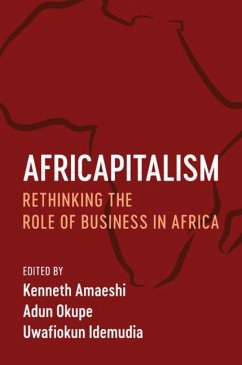Africa is on the rise. Enabled by natural resources, commodity trading and the recent discovery of Africa as the last frontier of capitalism by the global market, African entrepreneurs are now being empowered as economic change agents. How can this new economic elite engage in the sustainable development of the continent? 'Africapitalism', the term coined by Nigerian economist Tony O. Elumelu, describes an economic philosophy embodying the private sector's commitment to the economic transformation of Africa through investments generating economic prosperity and social wealth. The concept has attracted significant attention in both business and policy circles. Promoting a positive change in approach and outlook towards development in Africa, this book consolidates research and insights into the Africapitalism movement, and will appeal to scholars, researchers and graduate students of Africa studies, international business, business and society, corporate social responsibility, strategic management, economic thought, international political economy, leadership and development studies.
Hinweis: Dieser Artikel kann nur an eine deutsche Lieferadresse ausgeliefert werden.
Hinweis: Dieser Artikel kann nur an eine deutsche Lieferadresse ausgeliefert werden.
'African societies have too often been interpreted and shaped through the eyes of other parts of the world. This is now being challenged by African social scientists and entrepreneurs, a major result of which is the idea of Africapitalism - a form of capitalism that responds to community rather than individualistic values. How viable is this? Is it a new contribution to study of the diversity of capitalism? Will it enable African economies to break out of their dependent role in world trade and innovation? The contributors to this original and path-breaking book subject these and related questions to constructively critical attention, with implications of interest to scholars and economic and political decision makers in all parts of the world.' Colin Crouch, Emeritus Professor, University of Warwick








